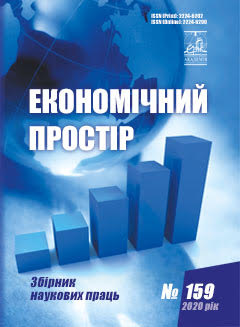MODERN ANTI-CRISIS STRATEGIES OF DEVELOPED COUNTRIES
Abstract
The article is devoted to the study of the specifics of world crises, the study of modern anti-crisis strategies of developed countries and the substantiation of tools and mechanisms for overcoming crisis phenomena in the world economy. The object of research is the process of development and implementation of anti-crisis strategies in the leading countries of the world. The mechanisms of overcoming crisis phenomena in the developed countries of the world are the subject of the study. The article considers the essence of crisis phenomena in the world economy, critically examines the specifics of world economic crises, and studies the main types of crisis strategies of countries. The analysis of the peculiarities of application of modern methods and tools of strategic anti-crisis regulation, as well as the study of anti-crisis strategies and anti-crisis management programs of the EU and USA allowed proposing and substantiating priority areas of anti-crisis strategies of developed countries at the present stage. It is established that the main fields of application of anti-crisis policy of governments include monetary policy, support for the real sector of the economy, the banking system, fiscal policy and also social policy measures (social protection and reduction of unemployment). The article substantiates that each country develops its own optimal set of anti-crisis tools and mechanisms for their application, differ in scale, priorities, focus and ranking. The methodological bases of the study are both general and special methods of scientific knowledge: descriptive-analytical, analysis and synthesis, methods of quantitative and qualitative comparisons. Monographic research and periodical publications of domestic and foreign economists, materials and analytical reports of international organizations, international consulting companies and analytical centers are the information basis of the article. The results of the work can be used in further research and practical development in the planning and implementation of anti-crisis strategies of countries, including for Ukraine.
References
Міждисциплінарний словник з менеджменту : навчальний посібник / за ред. Д.М. Черваньова, О.І. Жилінської. Київ : Нічлава, 2012. 624 с.
Мочерний С.В, Каніщенко Л.О., Устенко О.А. Короткий курс економічної теорії : навчальний посібник. Тернопіль : Економічна думка, 2000. 324 с.
IMF. World economic outlook reports, April 2020. URL: https://www.imf.org/en/Publications/WEO/Issues/2020/04/14/weo-april-2020.
Антонюк Н.А. Зарубіжний досвід антикризового управління національною економікою для України. Науковий вісник Одеського національного економічного університету. 2018. № 2. С. 5–22. URL: http://nbuv.gov.ua/UJRN/Nv_2018_2_3.
Rezvani H. Іntermixture of Crisis Management in Guidelines of organization. Tadbir Journal. 2017. № 177. 23 р.
Ващенко А.В. Сучасні методи та інструменти стратегічного антикризового регулювання розвинених країн світу. Національні економічні стратегії розвитку в глобальному середовищі : зб. тез доп. міжнар. наук.-практ. конф., м. Київ, 21 квітня 2020 р. Київ, 2020. С. 61–63.
Міністерство економіки України. Досвід країн світу щодо подолання світової фінансової кризи. URL: www.me.gov.ua/file/link/146035/file/krisis_p.doc.
American Recovery and Reinvestment Act of 2009. URL: https://www.gpo.gov/fdsys/pkg/PLAW-111publ5/pdf/PLAW-111publ5.pdf.
Internationl Monetary Fund. Policy responses to COVID-19. URL: https://www.imf.org/en/Topics/imf-and-covid19/Policy-Responses-to-COVID-19.
Fitch Ratings. Global Economic Outlook – Coronavirus Crisis. URL: https://www.fitchratings.com/research/sovereigns/global-economic-outlook-covid-19-crisis-update-april-2-2020-02-04-2020.
Chervanjov, D.M., Zhylinsjka, O.I. (Ed.). (2012). Mizhdyscyplinarnyj slovnyk z menedzhmentu. Kyiv: Nichlava.
Mochernyj, S.V, Kanishhenko, L.O., & Ustenko, O.A. (2000). Korotkyj kurs ekonomichnoji teoriji. Ternopilj: Ekonomichna dumka.
IMF. (2020). World economic outlook reports. Retrieved from: https://www.imf.org/en/Publications/WEO/Issues/2020/04/14/weo-april-2020.
Antonjuk, N.A. (2018). Zarubizhnyj dosvid antykryzovogho upravlinnja nacionaljnoju ekonomikoju dlja Ukrajiny. Naukovyj visnyk Odesjkogho nacionaljnogho ekonomichnogho universytetu, 2, 5-22. Retrieved from: http://nbuv.gov.ua/UJRN/Nv_2018_2_3.
Rezvani, H. (2017). Іntermixture of Crisis Management in Guidelines of organization. Tadbir Journal, 177, 23.
Vashhenko, A.V. (2020). Suchasni metody ta instrumenty strateghichnogho antykryzovogho reghuljuvannja rozvynenykh krajin svitu. Mizhnarodna naukovo-praktychna konferencija «Nacionaljni ekonomichni strateghiji rozvytku v ghlobaljnomu seredovyshhi». Kyiv: KOMPRYNT.
Ministerstvo ekonomiky Ukrajiny. (2020). Dosvid krajin svitu shhodo podolannja svitovoji finansovoji kryzy. Retrieved from www.me.gov.ua/file/link/146035/file/krisis_p.doc.
American Recovery and Reinvestment Act of 2009. Retrieved from: https://www.gpo.gov/fdsys/pkg/PLAW-111publ5/pdf/PLAW-111publ5.pdf.
Internationl Monetary Fund. (2020). Policy responses to COVID-19 – Retrieved from: https://www.imf.org/en/Topics/imf-and-covid19/Policy-Responses-to-COVID-19.
Fitch Ratings. (2020). Global Economic Outlook – Coronavirus Crisis. Retrieved from: https://www.fitchratings.com/research/sovereigns/global-economic-outlook-covid-19-crisis-update-april-2-2020-02-04-2020.



